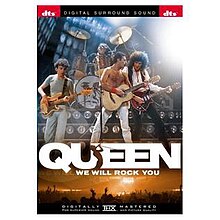
Queen are a British rock band formed in London in 1970 by Freddie Mercury, Brian May, and Roger Taylor, later joined by John Deacon (bass). Their earliest works were influenced by progressive rock, hard rock and heavy metal, but the band gradually ventured into more conventional and radio-friendly works by incorporating further styles, such as arena rock and pop rock.

The Freddie Mercury Tribute Concert for AIDS Awareness was a benefit concert held on Easter Monday, 20 April 1992, at Wembley Stadium in London, England, for an audience of 72,000. The concert was produced for television by Ray Burdis, directed by David Mallet and broadcast live on television and radio to 76 countries around the world, with an audience of up to one billion. The concert was a tribute to Queen's lead vocalist, Freddie Mercury, who died of an AIDS-related illness on 24 November 1991.

"Under Pressure" is a song by the British rock band Queen and singer David Bowie. Originally released as a single in October 1981, it was later included on Queen's 1982 album Hot Space. The song reached number one on the UK Singles Chart, becoming Queen's second number-one hit in their home country and Bowie's third, and also charted in the top 10 in more than 10 countries around the world.

"Crazy Little Thing Called Love" is a song by the British rock band Queen. Written by Freddie Mercury in 1979, the track is included on their 1980 album The Game, and also appears on the band's compilation album Greatest Hits in 1981. The song peaked at number two in the UK Singles Chart in 1979 and became the group's first number-one single on the Billboard Hot 100 in the US in 1980, remaining there for four consecutive weeks. It topped the Australian ARIA Charts for seven weeks. It was the band's final single release of the 1970s.

A Show of Hands is a live album by the Canadian rock band Rush, released in 1989. The band released a video of the same name, originally on VHS and LaserDisc, the same year. A DVD version was released as part of a box set in 2006, and as an individual DVD in 2007. In 2015 it was reissued after being remastered by Sean Magee at Abbey Road Studios following a direct approach by Rush to remaster their entire back catalogue.

"Tie Your Mother Down" is a song by the British rock band Queen, written by lead guitarist Brian May. It is the opening track and the second single from their 1976 album A Day at the Races. On its original release as a single in 1977 the song peaked at 31 in the UK Singles Chart. More than 20 years later, it was released as a double a-side to "No-One but You " where it reached 13 in UK Singles Chart. On the album the song is preceded by a one-minute instrumental intro featuring a Shepard tone melody, performed by Brian May, which is reprised in the ending of "Teo Torriatte": this was intended to create a "circle" within the album.
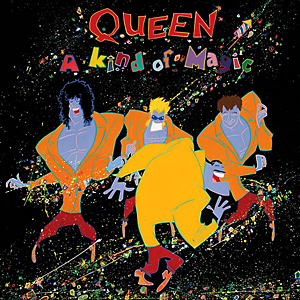
A Kind of Magic is the twelfth studio album by the British rock band Queen, released on 2 June 1986 by EMI Records in the UK and by Capitol Records in the US. It is based on the soundtrack to the film Highlander, directed by Russell Mulcahy.
Queen Live at WembleyStadium, also referred to as Queen Live At Wembley, Queen At Wembley, Queen Live At Wembley '86, Live At Wembley and Live At Wembley '86, is a live concert by British rock band Queen at Wembley Stadium, London, England on Saturday 12 July 1986. The recording is a performance of the Magic Tour which took place during the summer of 1986.

Queen on Fire – Live at the Bowl is a DVD/live album by the British rock band Queen released on 25 October 2004 in Europe and on 9 November 2004 in the US. It was recorded live at the Milton Keynes Bowl, Buckinghamshire, England, on 5 June 1982 during the Hot Space Tour. A DVD was also released with the complete concert and bonus material, such as band interviews and tour highlights.
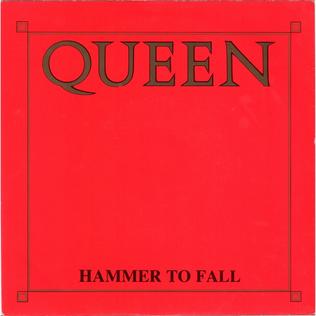
"Hammer to Fall" is a 1984 song by the British rock band Queen. Written by guitarist Brian May, the song is the eighth track on their 1984 album The Works. It was the fourth and final single to be released from that album, although the single version was edited down by thirty seconds from the version on the album. Different sleeves were used to package this single and the live picture sleeve is now a collector's item. The song harks back to the old roots of the band, being built around a hard angular and muscular riff.

A Show of Hands is a concert film released on VHS, Laserdisc and DVD by the Canadian rock band Rush. It documents a live concert performance by the band on their 1987-88 Hold Your Fire Tour. In 1989, the band released an audio album of the same name on vinyl LP, audiocassette, and compact disc. The video comprises an entirely different recording, and features a different track list.

"I Want It All" is a song by British rock band Queen, featured on their 1989 studio album, The Miracle. Written by guitarist and vocalist Brian May and produced by David Richards, it was released as the first single from the album on 2 May 1989. "I Want It All" reached number three on the singles charts of the United Kingdom, Finland, Ireland and New Zealand, as well as on the US Billboard Album Rock Tracks chart. Elsewhere, it peaked at number two in the Netherlands and charted within the top 10 in Australia, Belgium, Germany, Norway and Switzerland. With its message about fighting for one's own goals it became an anti-apartheid protest song in South Africa.

The Works is the eleventh studio album by the British rock band Queen. It was released on 27 February 1984 by EMI Records just shortly after recording for the album had been completed in the United Kingdom and it is the band's first studio album to be released by Capitol Records in the United States. After the synth-heavy Hot Space (1982), the album saw the re-emergence of Brian May and Roger Taylor's rock sound, while still incorporating the early 80s retro futuristic electronic music and New York funk scenes. Recorded at the Record Plant Studios in Los Angeles, California, and Musicland Studios in Munich, Germany, from August 1983 to January 1984, the album's title comes from a comment Taylor made as recording began – "Let's give them the works!".

We Are the Champions: Final Live in Japan is a live concert video of English rock band Queen's performance at the Yoyogi National Gymnasium, Tokyo on 11 May 1985 as part of the Japanese leg of The Works Tour.
The Magic Tour was a European concert tour by the British rock band Queen in 1986. The tour was in support of their latest album, A Kind of Magic, and featured 26 shows across Western Europe. In addition, the band performed one show behind the Iron Curtain in Hungary.
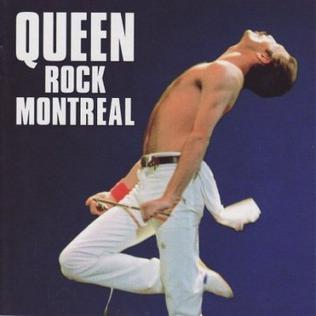
Queen Rock Montreal is a live album by the British rock band Queen. It was released on 29 October 2007 as a double CD, Blu-ray, DVD, and triple vinyl in the UK and the following day in the US.
The Game Tour was the eighth headlining concert tour by the British rock band Queen to support their successful 1980 album The Game. This tour featured the first performances in South America by the group. This tour marked the last time Queen played without a fifth player, as all tours from 1982 onwards would feature an extra man playing on keyboard.

Queen – Live In Budapest was retitled later as Hungarian Rhapsody: Queen Live in Budapest is a concert film of the British rock band Queen's performance at the Népstadion in Budapest on 27 July 1986. It was part of the band's final tour with original lead singer Freddie Mercury, The Magic Tour. Queen were one of the few bands from Western Europe to perform in the Eastern Bloc during the Cold War. The film had a limited theatrical release in Eastern Bloc countries in 1987/1988 with the concert physically released on VHS and Laserdisc in the UK and Japan on 16 February 1987 under the original title Queen Live In Budapest, and on CD, DVD and Blu-ray for the first time on 5 November 2012 worldwide, except in the United States where it was released a day later.
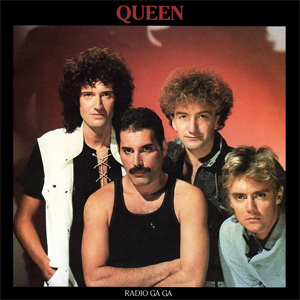
"Radio Ga Ga" is a 1984 song performed and recorded by the British rock band Queen, written by their drummer Roger Taylor. It was released as a single with "I Go Crazy" by Brian May as the B-side. It was included as the opening track on the album The Works and is also featured on the band's compilation albums Greatest Hits II and Classic Queen.
